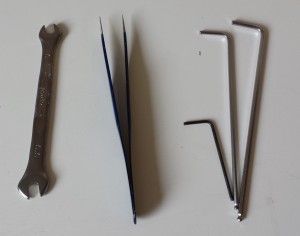Contents
Overview
The RepRapPro Fisher 1 is the latest RepRap self-replicating 3D printer from RepRapPro. The machine is a faster to assemble, networked 3D printer with bed probe for full geometric compensation.
These pages are the complete instructions for building, commissioning and using the RepRapPro Ltd version of RepRap Fisher. Like all RepRap machines, RepRapPro Fisher is fully open-source. It is licensed under the GPL. All the design files and software are available from the RepRapPro Ltd Github repository.
The RepRapPro Fisher is fitted with the open-source Duet electronics.
If you want to print the plastic parts for a RepRapPro Fisher, see below.
General notes
- BEFORE YOU ATTEMPT TO ASSEMBLE ANY PART OF THE RepRapPro FISHER 3D PRINTER, PLEASE READ THESE BUILD INSTRUCTIONS FULLY AND ENSURE YOU UNDERSTAND THEM. Although all parts are covered by warranty, this will be invalidated by your not following these build instructions. You are building a complicated machine; many different skills are required to build, to commission and to operate a 3D printer. Try not to rush your build, or you may miss out something vital!
- Give yourself plenty of space and ensure your work area is clean. Dust and dirt are a 3D printer’s worst enemy.
- All printed parts have been printed on RepRapPro’s own machines. Despite the fact that these machines are highly tuned RepRap 3D printers, some holes and features may need a little fettling to get the best performance from the RepRapPro Fisher. There is a video how-to on fettling 3D printed parts here on Vimeo.
- Before you start the build, please ensure you have all the components as listed on the packing list included in the kit. If anything is missing or damaged, please contact us through our contact page.
- We understand that people may want to change aspects of the machine’s design, and in fact we encourage this as it is one of the benefits of open-source development. Before changing anything, please be aware that the RepRapPro Fisher has been designed to maximise its build volume relative to the the machine’s footprint, and as such many of its components fit closely to others. So consider your changes carefully before you try to implement them. And when you find improvements, please tell us and the world so that we can include them in future kits, and so that existing owners can upgrade their own machines.
- The RepRapPro Fisher is a robust RepRap machine once assembled; however it does require a certain amount of care during assembly. If in doubt, force is usually not the answer! There are many ways to get support and advice; see below.
Printing parts for Fisher
If you have bought the hardware-only version of the Fisher kit, you will want to print and/or laser cut the parts. You may also want to print/cut spare parts for your printer. Parts are available as STL and DXF files (as appropriate) and SolidWorks files. You can also view a whole assembly of the printer, using the SolidWorks assembly file, in the free SolidWorks eDrawing viewer program.
The latest versions of parts (which should generally be backwards compatible with previous versions of Fisher) are available in the Fisher github repository. Older versions of Fisher are available under the list of ‘releases’. Some parts common to all our machines are in the Library github repository. The geared extruder drive, as it is shared with other RepRapPro printers, is in it’s own geared-extruder-drive github repository.
You can download the whole github repository, or download the parts individually. The list below shows the part number, part name, quantity and location of the parts. The ‘Location’ links to the parts page. This will also help you identify the parts, as it shows a preview of the part (STL only). If you download the parts individually, make sure you download the ‘RAW’ version of the file; if you right-click on a link and download, you will end up with a file with the right name (with .stl on the end), but it will actually be an html document!
STL parts (for printing) are in the Fisher/stl folder.
|
DXF parts (for laser cutting) are in the Fisher/dxf folder. Each dxf file there may contain multiple parts.
|
Get support
If you find you need help or advice with assembling, commissioning or using your RepRapPro Fisher 3d printer, you can use the following channels:
- Check the instructions again; we are regularly updating them with feedback from our growing user-base.
- Contact the support department of the company that sold you your printer.
- Check the Fisher discussion forum on the RepRap community forums.
- Contact us on our irc (internet relay chat) channel RepRapPro on freenode irc
- Contact us via email; see our contact page.
Tool List
Tools required for the build of the RepRapPro Fisher 3D printer:
Required
- Allen keys: 1.5mm, 2mm, 2.5mm (the long reach type, with a ‘ball’ hex on the end, are very useful)
- 5.5mm (M3) socket and/or spanner
- Fine tweezers
- Fine-nosed pliers
- Scissors
- Drill: 2.5mm
- Hand chuck, pin vice or small electric drill
- Small, flat-bladed, electrical screwdriver
- Digital Multimeter
- Hot air gun, or cigarette lighter (or other heat source such as a gas cooker ring for heating PTFE heatshrink; a hair dryer is not sufficient)
For adjusting plastic parts, if necessary
- Drills: 3mm, 4mm
- File
- Half round needle file
- Sharp craft knife
Nice to have, but not necessary
- Vernier or digital callipers

